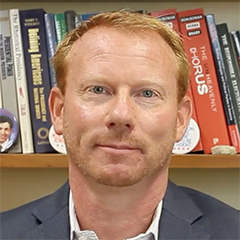You are not currently logged in. Please create an account or log in to view the full course.
Origins and Design
- About
- Transcript
- Cite
Electoral College
In this course, Dr David Andersen explores, explains and analyses the Electoral College and its role in US presidential elections. In the first module, we are introduced to the origins and design of the Electoral College, focusing in particular on the intentions of the Founding Fathers and the problems they sought to address with this system. In the second module, we explore the process by which the Electoral College works and how this has developed since its original conception in the late eighteenth century, including discussion of relevant constitutional amendments. In the third module, we interrogate the strengths and weaknesses of the Electoral College system as it presently operates, before moving on in the fourth and final module to assess some propositions for reforming the Electoral College, focusing on the strengths, weaknesses and likelihood of each of these proposed reforms. This course is particularly relevant for students and teachers of US Politics, as well as those more generally interested in US presidential elections and the US Constitution.
Origins and Design
In this module Dr David Andersen introduces us to the Electoral College, focusing in particular on: (i) its origins and design; (ii) the Founding Fathers’ attempts to reconcile the need to establish a central authority with their hesitancy around bringing a “king-like” figure into the American polity and their desire to avoid making this central authority too powerful; (iii) the original functions of the US President and the importance of the figure of George Washington to this vision; (iv) James Madison’s reflections in The Federalist No. 51 (1788) on the Founding Fathers’ project; (v) the Electoral College as a form of indirect election modelled on the Catholic Church’s College of Cardinals; (vi) the role of the states in this process.
Cite this Lecture
APA style
Andersen, D. (2022, November 03). Electoral College - Origins and Design [Video]. MASSOLIT. https://massolit.io/courses/us-politics-electoral-college
MLA style
Andersen, D. "Electoral College – Origins and Design." MASSOLIT, uploaded by MASSOLIT, 03 Nov 2022, https://massolit.io/courses/us-politics-electoral-college

